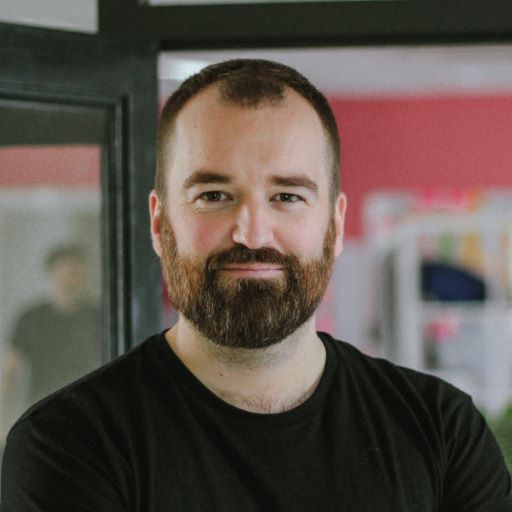
Last autumn, Mina announced that it had become B Corporation (B Corp) certified. The global B Corp movement sets a standard for businesses who want to ‘do good’ through their actions towards the environment, their employees and the impact they make in their local community. In this interview with Mina Co-Founder and Managing Director, Chris Dalrymple, he tells us about the process, why it took longer than expected to achieve certification, how its impact is already being felt, and he offers advice to other businesses that are considering becoming a B Corp. This is an abridged version of the interview with Chris, you can hear it in full on Episode 75 of the Sheffield Digital podcast.
For anyone who hasn’t come across your company before, please can you give us a quick reminder about what Mina does?

Mina’s co-founders came together to solve a problem: as a lot of businesses migrate to electric vehicles at scale, how do they pay for the charging of those vehicles? So, we’re a B2B SAAS start-up that basically makes it really easy for businesses to manage payment for charging electric vehicles, especially at drivers’ homes, or in public.
Last autumn, Mina became B Corporation Certified (or B Corp for short). For anyone who hasn’t heard this, can you explain what it means?
B Corp is a certification managed by B Lab, to show that a business is balancing purpose and profit. It doesn’t mean we’re a non-profit or a charity; we’re a business, we want to grow, we want to make profit, and that’s not a dirty word. But we also want to balance that with a sense of purpose.
Loosely, it’s around environmental purpose and that is core to us, given the type of product that we have. It’s about people and the workforce as well, and it’s about community and the local economy, and the positive impact that you might have locally.
It works like a scorecard, a set of self-certification questions and you have to hit a certain score to qualify – I think it’s 80 – from around 200 questions. Providing you do, and you can evidence this, you get the B Corp certification, joining a list of lots of other businesses globally, like Patagonia, Innocent Smoothies and other famous brands who are all part of that same movement.
What inspired your company’s decision to apply to become certified?
Mina was an opportunity to do things as I’d wanted to do for a while; things around the culture of the organisation, the ways of working, the trust that we put in our team members and how much we empower our team.
As we started to talk about culture a little more and what kind of business we want to have, I started to research B Corp. I’m quite a data-driven person; I like numbers and dashboards and KPIS. I suppose this was a way of taking something fairly intangible – the idea of being a good business – and making it quite data driven and giving us focus on the right things. As I started to talk about it internally with team members, people were quite excited about it, so we decided to take the plunge.
How long did this process take from start to finish?
From thinking we should do it to actually getting the certification, it was probably two years. It was a pretty intense process! Not that you’re continually working on it for that period, but there’s a process of going through different bits of the certification, submitting it and waiting for an analyst. So there’s a lot of to-ing and fro-ing. But yeah, it was end-to-end two years, so it’s not something to take lightly.
Did you expect it to take that long?
We thought it’d be a few months but to be fair, I got the sense that we were one of quite a few businesses trying to do it at the same time, and they have limited resources in terms of analysts. So I feel like we applied at a busy period but they do give you an idea as to how long it will take on the website, so it’s worth checking that out.
Can you tell us what the main steps involved in the application process are?
You don’t have to pay any money at the beginning or commit to anything in the short term. You fill in an impact assessment which is roughly 200 questions tailored to your business type and size across lots of different areas of the business. You have to score more than the 80 point threshold, and you have to make a legal commitment, so you have to amend your Articles of Association as a business to say that you’re balancing profit and purpose.
You submit all this for assessment and you’re then assigned an analyst (this is the bit for us that took quite a long time). They will ask you to upload proof in each of the key areas, but only one or two questions in each. That might be a policy on parental leave, for example. They might knock your score down slightly based on what they see. So I think we went from 98 points to 96 points, but providing you’re over 80 points, you pay your fee and that’s it, you’re certified as a B Corp.
You have to recertify every three years and at the end of each year, they encourage you to create an impact report. So it’s not one of those things where you get the badge and you leave it there. You keep on top of things beyond that initial certification, but this is good. It’s really important that the standards are high.
You’ve said on your website that becoming a B-Corp represents your commitment to goals outside of shareholder profit. Can you tell me a bit more about these goals, and how this certification aligns with Mina’s mission?
Our vision is zero emissions from road transport and our mission is about the part we play within that, by having a strong product that ultimately encourages businesses to add more electric vehicles to their fleet, meaning we can actually get more diesel and petrol vehicles off the road, because it’s easier to make that conversion. So there’s a really strong alignment with our vision and mission and being a B Corp.
Also, one of our values is care and it might sound generic or wishy washy but we take it really seriously. We care a lot for the community and for the people who work for the business, and we support and help them to grow. We don’t take them for granted. We have a really flexible working environment, people can work from wherever they want and we have flexibility on working hours. I’ve got kids myself, so I know the pain of school runs and after school activities and having work sit around that is really important.
Signing up to be a B Corp just brings these things a bit more front of mind and it raises the bar for things that we should be doing as an employer, and as a local business. It’s to have that alignment, and a balance with making profit; because we don’t exist without making money.
Since becoming certified, have you felt the impact on any areas of the business?
The pride of the people that people work for us. I think people want to be in businesses that do good, so it’s a nice stamp to really show that’s the case. I think it helps focus as well. If you’re joining a B Corp then you know that these things are important, so hopefully it has an impact on your day-to-day decisions because you know you’re part of a business that is very clear about its aims and goals.
From a recruitment point of view it makes quite a big difference. Some of the early employees said the fact that we were going through the B Corp process was quite a significant reason for them joining the business.
And I think generally in terms of the brand and our reputation, it’s been enhanced by the fact we have become a B Corp. We’re working with some big businesses in the UK like Openreach, OVO and Coca Cola, and considering how ethical a supplier is – it’s increasingly becoming part of the decision making process for companies.
How do you make sure that being a B-Corp is something that remains integral to the business, as opposed to just throughout the application process? How is Mina managing that?
It’s a good question. You’ve got to keep pushing these things. The certification is designed to stop you leaving it to one side because you have to recertify and you are meant to upload a yearly impact report.
Our challenge is going to be making sure that it’s reflected in all our policies and in things like our KPI reporting and our board updates. Generally when we’re talking about the progress of the business, we need to keep in mind those metrics that reflect those B Corp sensibilities.
We report regularly on a fairly wide-ranging team survey covering mental health, flexible working, job satisfaction and those kinds of things. We talk about those numbers regularly, and we make sure that we’re scoring highly and we address those things where there’s maybe a drop in scores. So I think it’s about extending this to make sure the environmental factors are also reflected.
Something I would recommend to other businesses is during the certification process we did have someone – Ruky – responsible for being the point person and making sure things were progressing. I think that’s pretty essential in the run up to getting your certification, you need one person who is responsible for it.
After you have it though, it needs to sit with your founders. It just doesn’t stick unless it’s believed in from the very top of the business.
If another company is reading this and thinks that becoming a B-Corp is something they’d like to achieve in 2023, what are the first steps they should be taking?
Have your point person. I think that’s really key, somebody who carries it throughout and is responsible for making sure that it progresses.
You can test the water with this process by signing up and going through some questions to see where you are now. You don’t have to pay anything and you don’t have to submit anything straight away, so you can just sound out what B Corp is asking you to do. It’s not a quick process, it might take you an hour to go through that first time, but it’s a really good way of understanding whether it’s for you.
I wouldn’t necessarily say becoming a B Corp is easy, but with a concerted effort, you know you can be a business that balances profit and purpose, it doesn’t have to be one or the other.
We’re really happy to answer questions, either myself or Ruky who did a lot of the work for us, so please feel free to get in touch either through the website or you can find us on the Sheffield Digital Slack channel.
Useful links
Listen to this interview in full on Episode 75 of the Sheffield Digital podcast:
To read more about the global B Corp movement, visit the website: www.bcorporation.net/en-us/
To undertake the initial free assessment that Chris refers to (the B Impact Assessment), go to: https://bcorporation.uk/b-corp-certification/how-to-certify-as-a-b-corp/bia-overview/
To find out more about Mina, visit the company’s website: https://www.mina.co.uk/ and follow Mina on Twitter for the latest company updates: https://twitter.com/EV_mina